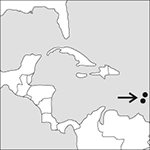
Source: MAPS IN MINUTES™ © RH Publications (1997)
Capital:
Kingstown
Area:
389 sq km (150 sq miles)
Population:
103,220 (2013 est)
Currency:
1 East Caribbean dollar = 100 cents
Religions:
Anglican 47.0%; Methodist 28.0% ; Roman Catholic 13.0%
Ethnic Groups:
Black 66.0%; mixed 19.0%; East Indian 6.0%
Languages:
English (official); French patois
International Organizations:
UN; OAS; CARICOM; Commonwealth; WTO; Non‐Aligned Movement
An island country in the Windward Islands of the Caribbean, consisting of the main island of Saint Vincent and two islets of the Grenadines.
Physical
The main island, Saint Vincent, is 29 km (18 miles) long. Of volcanic origin, it has forested, rugged mountains rising to the active volcano of Mount Soufrière. There are picturesque valleys and fertile well-watered tracts. While the climate is tropical, there are hurricanes and occasional earthquakes.
Economy
Tourism and banana production are the two most important economic activities. Banana cultivation has suffered severely from the end of preferential trade with the EU (from 2009), hurricane damage in 2010, and disease in 2015. Its revival is a major political challenge. There is a small offshore banking sector, and remittances from expatriates are important.
History
When Christopher Columbus discovered the islands in 1498 they were inhabited by Carib Indians. Europeans did not colonize the islands until the 18th century when they made treaties with the Caribs. The islands changed hands several times but the British finally gained control in 1796. Most of the Caribs were deported and most of those remaining were killed in volcanic eruptions in 1812 and 1902. The British brought many African slaves to the islands, and after the abolition of slavery in 1834 many Portuguese and Asian labourers were brought in to work on sugar cane plantations. The country was a British colony from 1871 until 1956, when colonial rule was ended. Part of the Federation of the West Indies (1958–62), Saint Vincent and the Grenadines became fully independent in 1979. The country was governed from 1984–2001 by the right-wing New Democratic Party under Sir James Mitchell. However, the 2001, 2005, 2010, and 2015 elections were won by the Unity Labour Party, led by Ralph Gonsalves. In 2009 voters rejected becoming a republic and backed retaining the British monarch as head of state.
- electrodynamic instrument
- electrodynamics
- electrodynamometer
- electroencephalogram
- electroencephalograph
- electroendosmosis
- electroforming
- electrogenic
- electrogenic pump
- electroglottograph
- electrographic printer
- electrohydrodynamics
- electrokinetic potential
- electroless plating
- electrolocation
- electroluminescence
- electroluminescent display
- electrolysis
- electrolyte
- electrolytic capacitor
- electrolytic cell
- electrolytic conduction
- electrolytic corrosion
- electrolytic dissociation
- electrolytic gas